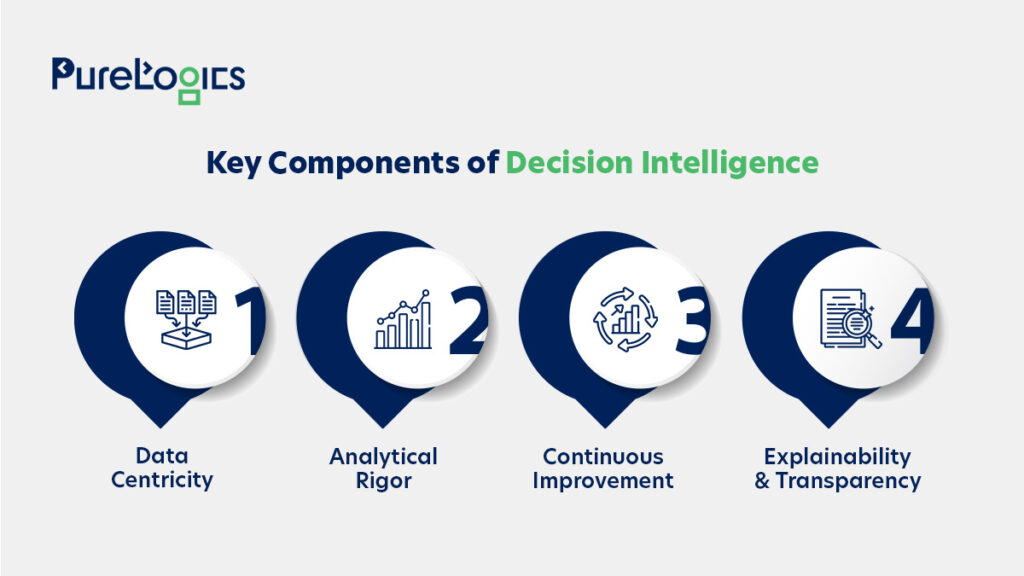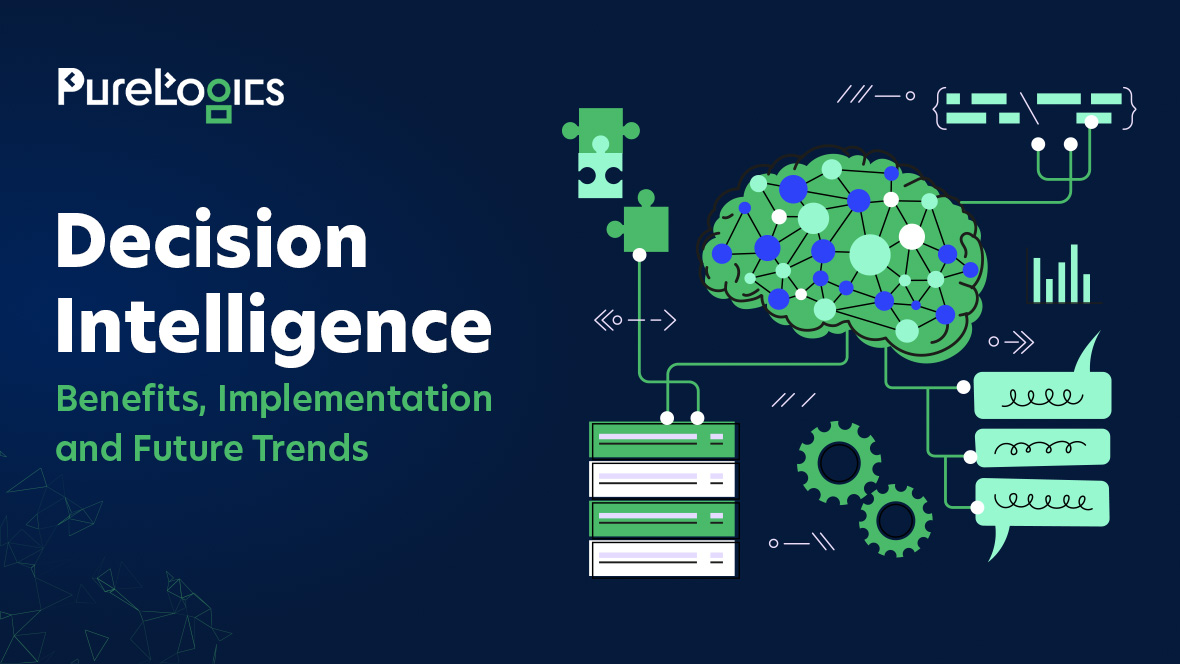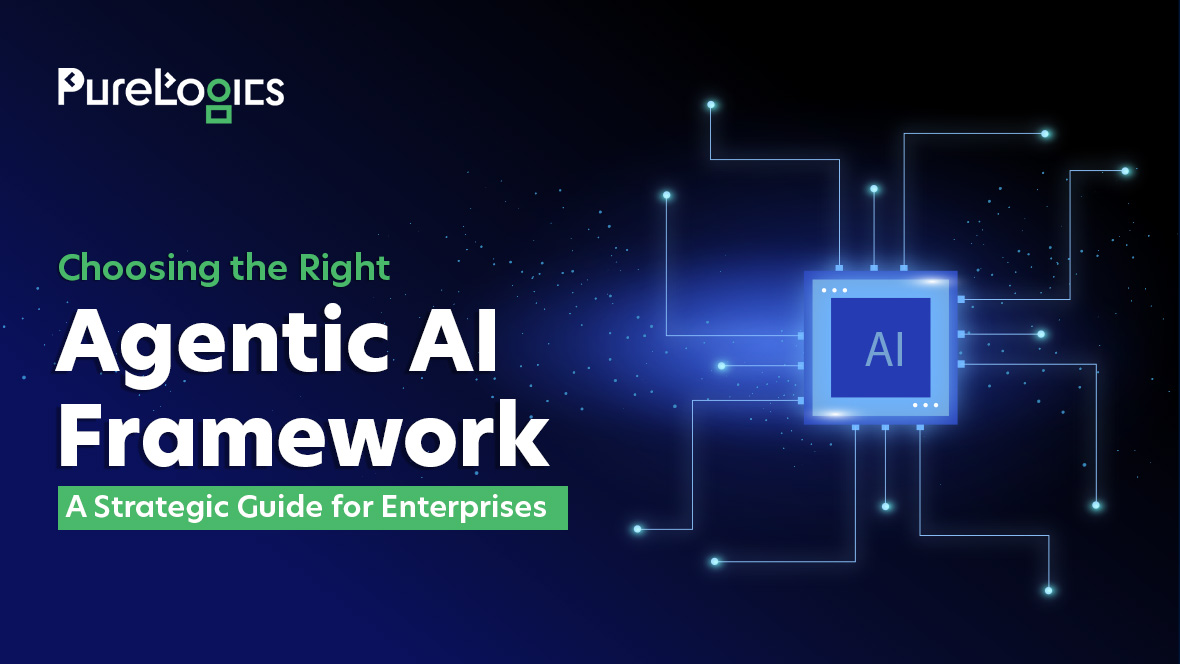Making decisions is central to all business activities, whether long-term strategy or everyday operations. The decision-making process has become more complicated with today’s overwhelming data. Traditional methods, which often struggle to handle large datasets, tend to miss crucial insights, causing businesses to lose out on opportunities for personalized service. This is where DI is most useful.
In an era where businesses face tough challenges and fierce competition, making timely, informed decisions can be a real advantage. DI not only predicts future trends but also suggests actions to enhance outcomes. Its applications span various fields, from supply chain management to improving customer experiences, giving companies a competitive edge.
This article takes a closer look at Decision Intelligence from different perspectives. We’ll start by explaining what DI is and how it differs from traditional business intelligence. Then, we’ll cover the key principles and benefits of adopting DI in your business. We’ll also go over the steps to successfully implement DI, the tools and technologies involved, and the ethical issues that may arise. Lastly, we’ll explore DI’s impact across various industries and provide insights into its future potential.
What is Decision Intelligence?
Decision Intelligence (DI) is a modern approach to decision-making that uses advanced analytics, machine learning, and artificial intelligence (AI) to offer businesses actionable insights. Unlike traditional business intelligence (BI), which focuses mainly on providing information, DI actively guides and automates decision-making.
At its core, DI is focused on:
Data-driven Insights
Bring out valuable patterns, forecasts, and trends from data to support strategic decisions.
Automated Decision-making
Using AI and machine learning to handle repetitive and complex decision tasks, freeing up human resources for more important initiatives.
Optimizing Outcomes
Leveraging data insights to improve decisions’ quality, consistency, and effectiveness, leading to better business results.
Key Components of Decision Intelligence
DI is based on several foundational principles that ensure effective implementation and help organizations make well-informed decisions using data and technology. These principles include:

Data-centricity
High-quality data is essential, and its accuracy, completeness, and accessibility must be ensured for proper analysis and modeling.
Analytical Rigor
Several advanced techniques, such as machine learning, predictive analytics, and statistical modeling, are used to get insights from data.
Continuous Improvement
Encouraging experimentation and feedback loops to continuously refine decision-making processes and models.
Explainability & Transparency
The insights provided must be clear and easy to understand so stakeholders can trust and act on them confidently.
Benefits of Decision Intelligence
The benefits of implementing decision intelligence (DI) are vast, enhancing decision-making processes across various levels of business operations. Here’s a summarized breakdown:
Optimized Decision-Making Precision
You can get data-driven insights through DI and increase reliability by relying on comprehensive, real-time data analysis instead of intuition.
Additionally, AI and analytics reduce human biases, ensuring objective and consistent outcomes.
Improved Operational Efficiency
This framework frees up the resources for multiple strategic tasks and boost decision cycles by simply automating routine decisions. It also offers insights that help optimize resource use, reduce waste, and boost productivity.
Enhanced Risk Management
Decision intelligence highlights potential threats via trend prediction and historical data analysis. Additionally, contingency planning offers powerful planning through predictive modeling and scenario analysis.
Better Strategic Planning
Data-driven insights ensure that decisions are made based on long-term goals and objectives. In addition, it stimulates different strategies and assesses their impacts on confident decision-making.
Higher Adaptability & Agility
It allows quick responses to market ups and downs and external factors by using real-time insights. Continuous monitoring allows businesses to stay competitive in evolving markets.
Quality Customer Insights and Customization
Offers a comprehensive knowledge of customer needs and preferences for targeted strategies. It also personalizes products and services to individual preferences, enhancing customer loyalty.
Competitive Advantage
DI drives business growth through informed innovation and differentiation. Enables faster, more accurate decision-making, reducing product launch times.
Efficiency Gains & Cost Reduction
It lowers the decision-making costs through automation. Furthermore, DI identifies inefficiencies, leading to process optimization and better resource utilization.
Improved Governance & Compliance
Ensures compliance by analyzing data for potential issues and recommending corrective actions. Transparent decision processes enhance accountability and alignment with organizational values.
Flexibility & Scalability
Decision intelligence is a highly scalable framework that supports consistent decision-making processes as the company progresses. Also, it adapts across industries, functions, and decision-making scenarios.
Long-Term Organizational Sustainability
Decision intelligence supports ethical and strategic decision-making, guaranteeing long-term success. Also, it helps align decisions with environmental, social, and governance (ESG) goals, fostering responsible practices.
Ready for Smarter Decisions?
Unlock predictive insights and real-time solutions with DI.
Implementation of Decision Intelligence
To successfully implement Decision Intelligence (DI) in an organization, a structured approach that aligns data, technology, and human expertise is crucial. Here’s a step-by-step guide to ensure a smooth DI adoption process:
Define Your Scope and Objectives
Focus on decisions that will have the most impact on business outcomes. Pinpoint high-value areas with clear metrics for success. Define specific, measurable, achievable, relevant, and time-bound (SMART) objectives for your DI implementation.
Additionally, assess financial and human resources needed, including technology investments and training requirements.
Establish a Data Foundation
Identify all relevant internal and external data sources. Evaluate data quality, accessibility, and how it supports decision-making. Create a unified data infrastructure by integrating disparate data sources. Also, ensure robust policies for data quality, security, and regulation compliance (e.g., GDPR).
Build Your Analytics and AI Capabilities
Select analytics and AI tools based on your organization’s needs, data scale, and technical capabilities. You must create a team with skills in machine learning, analytics, and data science. Consider hiring or training personnel or partnering with external consultants. Additionally, it set up a transparent model creation, testing, and deployment process.
Design and Implement Decision Models
Formalize decision-making processes with frameworks that specify inputs, outputs, and decision rules. Utilize techniques like decision trees, Bayesian networks, or influence diagrams to map out decision-making logic. Use historical data to validate models, ensuring accuracy and reliability.
Integrate with Existing Systems
Develop automated pipelines to seamlessly integrate data into your DI platform. Connect the DI platform to existing business systems for real-time data access and automated decision-making.
Create easy-to-use interfaces for decision-makers to access and act on insights.
Automate and Optimize Decision Execution
Assess decision processes to identify repetitive tasks that can be automated through AI or Robotic Process Automation (RPA). It introduces automation to streamline decision-making and boost operational efficiency. Furthermore, continuously evaluate automated processes for improvement and fine-tune them for better performance.
Establish a Decision Intelligence Culture
Secure backing from top management to drive adoption and accountability.
Provide training to enhance employees’ ability to understand and use data in decision-making. DI fosters a culture where decisions are backed by data, ensuring transparency and trust.
Continuously Evaluate and Improve
Measure the success of your DI initiative against predefined Key Performance Indicators (KPIs). Refine your DI processes based on new data insights and user feedback. Stay updated with emerging trends in decision intelligence and adapt as needed.
Key Considerations
Begin with a pilot project to demonstrate value before scaling DI across the organization. Ensure collaboration between data scientists, business analysts, and decision-makers for better outcomes. Minimize bias, ensure data privacy, and maintain transparency in AI models to uphold ethical standards.
By following this structured approach, organizations can harness the full potential of Decision Intelligence to improve decision-making accuracy, efficiency, and agility, driving sustainable business growth.
Future Trends of Decision Intelligence
The future of Decision Intelligence (DI) holds immense promise as technological advancements and the growing need for data-driven decision-making pave the way for widespread adoption. Below are some key trends and opportunities that are shaping the future of DI:
Transparency & Explainable AI (XAI)
As AI-driven decision-making grows, there is increasing pressure for transparency and explainability, particularly in healthcare, finance, and law. Stakeholders want clarity on how decisions are made to build trust and accountability.
Continued progress in Explainable AI (XAI) will provide new methods to interpret AI models, enabling users to understand the rationale behind decisions. This will enhance ethical AI practices and foster more responsible AI adoption across industries.
Data Privacy & Federated Learning
As privacy regulations (e.g., GDPR) tighten, Federated Learning—allowing organizations to train AI models collaboratively without sharing raw data—will become essential. This method enables robust AI development while preserving data privacy.
Organizations will increasingly use federated learning to develop and implement decision intelligence, especially in privacy-sensitive sectors like healthcare, financial services, and government.
Integration with Business Platforms & Processes
Decision intelligence will become deeply integrated into business operations, connecting real-time analytics with decision-making and automation. This will enable faster and more accurate decisions across multiple functions.
Vendors are building comprehensive DI platforms that combine data collection, analysis, modeling, and deployment. These end-to-end solutions will simplify adoption and make DI more accessible to various organizations.
Bias Mitigation & Ethical AI
As DI evolves, ensuring that AI systems remain unbiased and fair will be a top priority. Methods to detect and reduce bias in AI models will be key to fostering ethical business decision-making.
With DI playing a larger role in critical decisions, accountability mechanisms—such as audit trails and human oversight—will be increasingly important to ensure ethical and responsible decision processes.
Predictive & Real-Time Decision-Making
Making real-time decisions based on continuous data streams will be crucial for industries like manufacturing, retail, and logistics, enabling them to adapt rapidly to market changes.
DI will leverage advanced predictive models to anticipate future trends and prescribe the best courses of action, allowing organizations to act proactively rather than reactively.
Industry-Centric Applications
DI will enhance risk management, fraud detection, and personalized financial services in the finance industry by making more accurate predictions based on vast amounts of real-time data.
Decision intelligence can improve patient outcomes by analyzing medical data for more precise diagnoses and treatment plans while ensuring compliance with regulatory requirements.
The application of DI in manufacturing will optimize production processes, reduce downtime, and manage supply chains more effectively, leading to increased operational efficiency.
Embrace the Power of DI
Future-proof your strategy with predictive insights and real-time solutions.
Conclusion
The future of Decision Intelligence is bright, as it positions organizations to make more informed, faster, and ethical decisions. DI offers solutions that blend data analytics, AI, and human expertise, making it a vital tool for navigating complex business landscapes.
As AI and machine learning advance, Decision Intelligence will push decision-making boundaries, offering organizations a competitive edge. Businesses that embrace DI stand to achieve operational efficiency, enhanced customer experiences, and long-term success in an increasingly data-driven world.
By investing in DI and aligning it with business objectives, organizations will unlock smarter decision-making and future-proof their strategies.
Ready to take the next step with Decision Intelligence? PureLogics possesses [years-of-experience] in offering AI and ML services that can level up your business. Connect with our experts to explore tailored DI solutions that can transform your decision-making processes!


 [tta_listen_btn]
[tta_listen_btn]
 January 8 2025
January 8 2025






